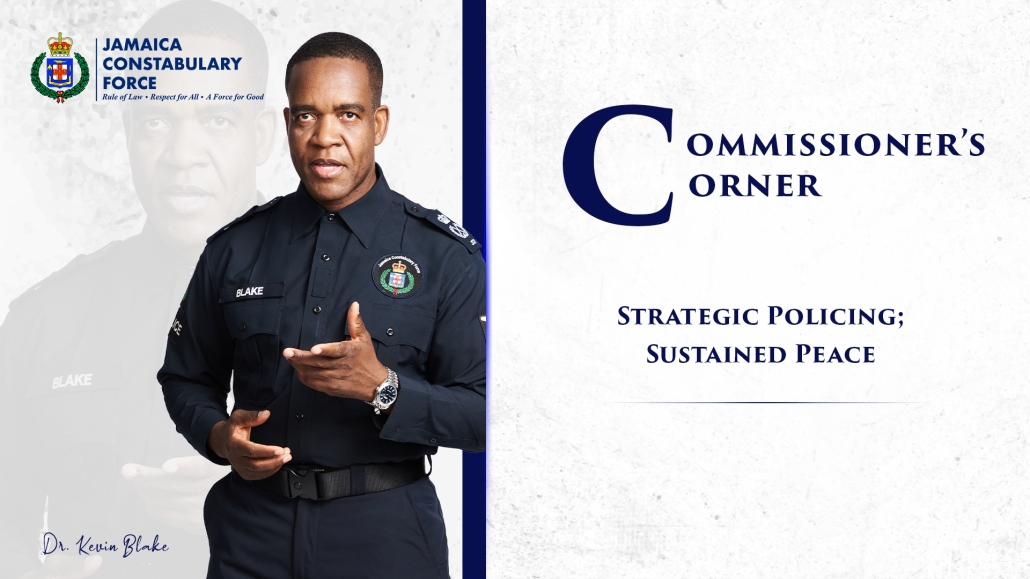
Commissioner’s Corner – Strategic Policing; Sustained Peace
Transformation does not announce itself in spectacle. It embeds itself in consistency. It builds from the inside out, shaping institutions through values, discipline, and a vision that outpaces the day-to-day news cycle. In the most recent Commissioner’s Corner, Police Commissioner, Dr Kevin Blake outlines a working theory of sustained public transformation, measured by the power to endure and improve.
The Commissioner explained that the Force has closed another historic quarter. “We have secured the second quarter in the bag, breaking yet another record as the lowest quarterly figure in over 25 years. The previous quarter held that title briefly.” This success is not isolated. It follows a series of methodical efforts in crime suppression, community policing, internal leadership cultivation, and evidence-based strategies. But the most critical insight comes next: “Can we do even better for this, the third quarter? That is our next target.”
The Commissioner’s appeal is not reactive. It is strategic. He places each quarter within a larger narrative arc—a framework of performance that resists complacency and discourages episodic victory laps. “We should not yet claim victory over this monster of crime and violence because of a successful first half of the year. Let us do it again, and even better, for this the next half,” he said.
Transformation, in this frame, becomes a discipline of duration. It demands vigilance in moments of quiet. It insists on resolve even when the data is in our favour. Commissioner Blake introduces the concept of resilience not as recovery but as repeatability. He said, “Resilience is not about never falling, but it is rather about how quickly we rise after a fall… resilience is also distinguishing oneself as a champion… one does not become a champion by winning one race.”
In the public sector, such thinking often disappears beneath layers of crisis management. But the JCF is engineering a different model—one where internal leadership and operational tempo are synchronised. “We may have some tough days… But again you have demonstrated resilience in realigning the train back on its track.” This metaphor reflects a police force with an embedded correctional capacity—able to absorb shocks and quickly restore momentum. That capacity is a marker of institutional maturity.
Leadership plays a defining role in this design. The Commissioner addresses his commanders with precision. “Commanders, continue to ensure that the men and women who you lead understands the mission as well as you understand it… and that they benefit from the best leadership.” These are not motivational words. They are operational instructions. Strategic clarity at the top must translate to tactical coherence on the ground. Each officer must understand not only what they are doing, but why it matters within the broader framework of reform.
The long game also calls for moral clarity. Dr Blake delivers a stark description of the threats that persist. “There are still yet a few who have not gotten the message that it is not wise to kill and maim in today’s Jamaica… these slow learning imbeciles prey upon citizens with deadly intents.” The tone is deliberate. It does not soften the reality of violence. But neither does it allow it to define the national narrative. For those acts that escape prevention, the Commissioner issues a direct mandate: “We must ensure we never fail in our response in bringing them to justice.”
National safety is both a policy objective and a social aspiration. It must speak to all Jamaicans, including those abroad. “So many of our fellow citizens in the Diaspora would love nothing more than to return… but had always been concerned about being victims of violent crime.” The JCF’s success in recent months expands the horizon of what is possible—for families, for retirees, for a country seeking to rewrite its international perception. “We must never accept that they are to be expected to spend the last few years of their lives in fear of some hoodlums who prey upon them…”
In every era, there are institutions that carry the weight of transition. They are required not only to perform but to symbolise. The JCF is stepping into that role. Its leaders are connecting tactical execution to strategic purpose. They are shaping a service identity grounded in national relevance. “These are our communities, from where we came, in which we live and raise our families, and to which we pledge our commitment to keep safe.”
The Commissioner’s remarks close on a note of sustained challenge. The task is not finished. It is not seasonal. It requires a repeated commitment to method, to vigilance, and to shared purpose. “The journey ahead will demand even more from each of us, but it also offers the promise of a safer, more hopeful Jamaica.”
Each officer is positioned not as a functionary, but as an agent of that promise. Institutional transformation becomes not an abstraction, but a task repeated every shift, every patrol, every arrest made or prevented. “The people are depending on us, and I am confident that together, we will rise to the occasion—not just once, but again and again—until safety is no longer the exception, but the norm.”
The JCF is building safety into the fabric of the nation; not through spectacle, but through repetition, through clarity, and through a public sector model committed to the long game.







